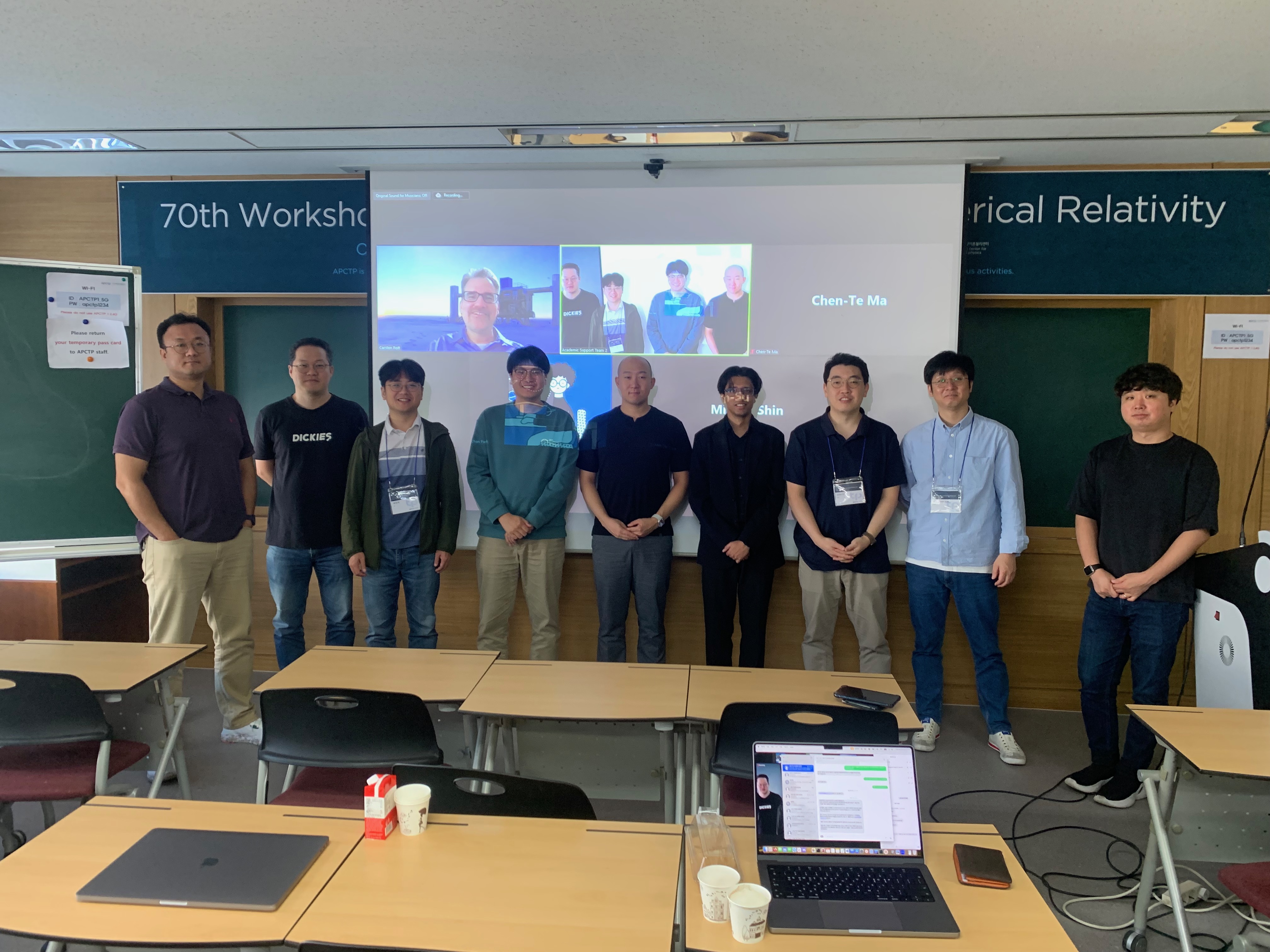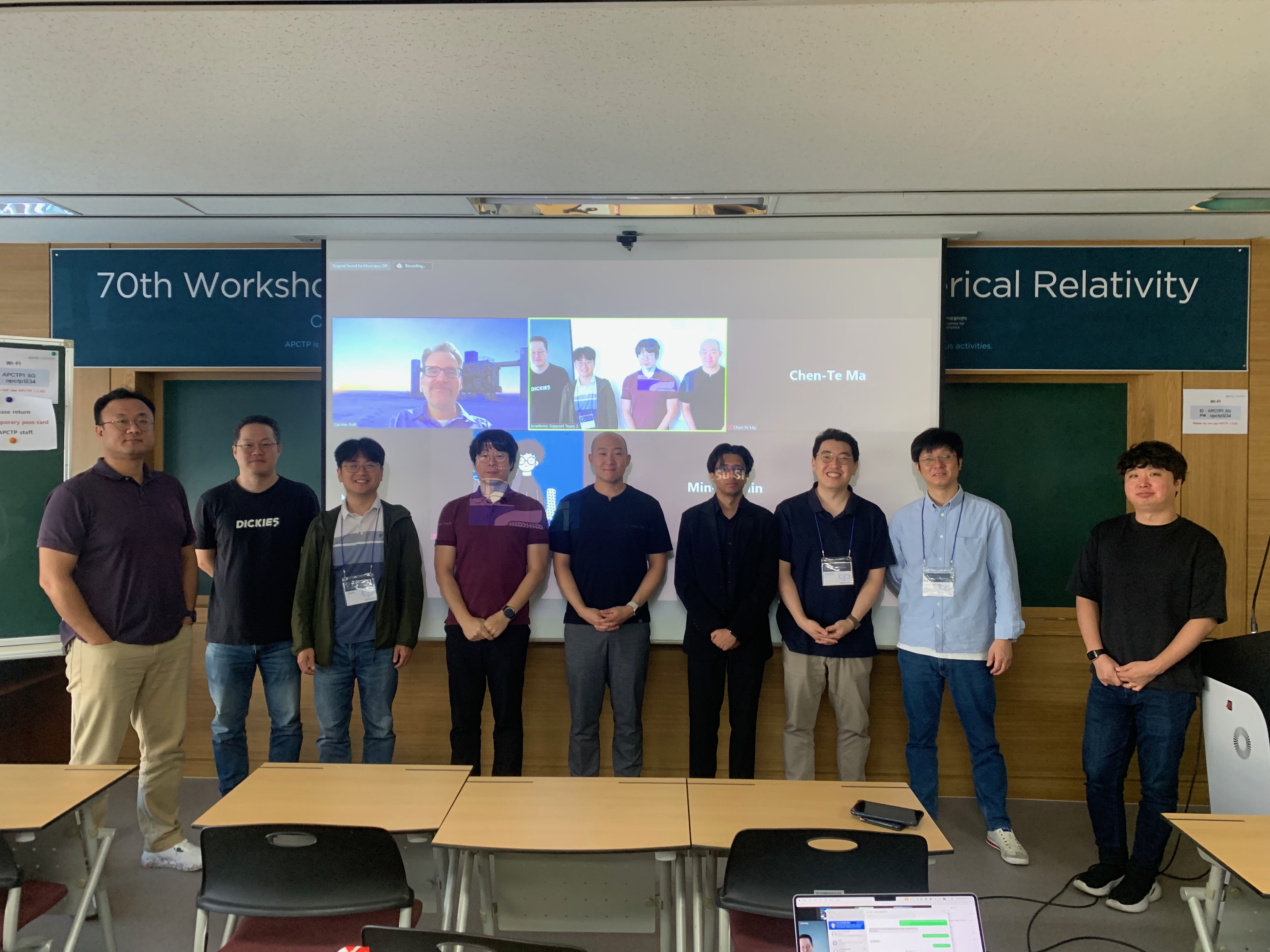Information
- Date: Oct. 4 (Wed.) - Oct. 5 (Thu.), 2023
- Venue: Rm #512, APCTP / Online (Hybrid)
- Accommodation: PIC
- Audience: Researchers and students in astrophysics
- Number of participants: 15 Offline / 15 Online
- Format: Long and intensive sessions from basic lecture to the latest research with a comfortable atmosphere to ask questions and discuss freely
- Sponsor: APCTP
- Contact
- Chan Park: iamparkchan at gmail dot com
- Jinho Kim: jkim at kasi dot re dot kr
Program
- Time zone: Korea Standard Time (UTC+09:00)
- Oct. 4 (Wed.)
- 14:25 - 14:50 [Student Session] Search for rare interactions of Dark Matter with high-energy neutrinos from distant point sources with the IceCube Neutrino Telescope (Woosik Kang, SKKU)
- 14:50 - 17:00 [Main Session 1] Identifying and Mitigating Transient Noises for Gravitational Wave Detectors (John J. Oh, NIMS)
- 17:10 - 18:00 Discussion
- Oct. 5 (Thu.)
- 10:00 - 12:10 [Main Session 2] Exploring the Universe with high-energy neutrinos (Carsten Rott, SKKU & University of Utah)
Sessions
- Identifying and Mitigating Transient Noises for Gravitational Wave Detectors
- Speaker: John J. Oh (NIMS)
- Time: Oct. 4 (Wed.) 14:50 - 17:00
- Speaking Language: Korean
- Slide Language: English
- Abstract: Identifying and reducing noise sources in a gravitational wave detector is a critical step in detecting gravitational wave signals. Identifying and understanding the sources of environmental and instrumental noise that can be mistaken for gravitational waves, and maintaining good data quality to capture pure gravitational wave signals, will increase the confidence in the detected gravitational wave signals. This talk will discuss the noise detection tools developed to verify signals from the KAGRA gravitational wave detector and the understanding of noise it provides, as well as bandgap engineering methods to reduce noise in the low-frequency band using the next generation of gravitational wave telescopes.
- Slide File: Oh
- Exploring the Universe with high-energy neutrinos
- Speaker: Carsten Rott (SKKU & University of Utah)
- Time: Oct. 5 (Thu.) 10:00 - 12:10
- Speaking Language: English
- Slide Language: English
- Abstract: We have arrived at a special moment in time, where we can now observe the Universe in fundamentally new ways using high energy neutrinos, gamma rays, cosmic-rays, and gravitational waves. By viewing the Universe through these cosmic messengers and in their combination, an era of discoveries awaits us. This talk will be focused on the tremendous progress that has been achieved on the neutrino frontier in our cosmic exploration. Latest results from the IceCube Neutrino Observatory including the observation of neutrinos from the Galactic plane, detection of an event at the Glashow resonance energy, the observation of a diffuse astrophysical neutrino flux, hints for clustering in the neutrino skymap and the multi-messenger observation of a flaring blazar coincident with energetic neutrino emissions will be reviewed. Prospects for discovering more extra-terrestrial high-energy neutrino sources, including those in our solar system, and ways to search for hints of physics beyond the standard model at energy scales beyond the reach of accelerators will be discussed. Plans for the next generation neutrino observatories will be reviewed.
- Slide File: Rott 1
- Slide File: Rott 2
- Slide File: Rott 3
- Slide File: Rott 4
- Search for rare interactions of Dark Matter with high-energy neutrinos from distant point sources with the IceCube Neutrino Telescope
- Speaker: Woosik Kang (SKKU)
- Time: Oct. 4 (Wed.) 14:25 - 14:50
- Speaking Language: English
- Slide Language: English
- Abstract: The recent discoveries of neutrino signals from distant sources, TXS 0506+056 and NGC 1068, provide opportunities to search for rare interactions neutrinos might encounter on their paths. One potential scenario of interest is the interaction between neutrinos and the dark matter in between a distant high-energy neutrino source and the Earth. When high-energy neutrinos from extragalactic sources interact with Dark Matter during their propagation, their fluxes may be suppressed at specific energy ranges after the interactions. These attenuation signatures from the interaction might be measurable on Earth with large neutrino telescopes such as the IceCube Neutrino Observatory. This analysis focuses on searching for rare interactions between sub-GeV dark matter and high-energy neutrinos from the IceCube-identified astrophysical neutrino sources for the first time. It considers several benchmark mediator cases and uses ~ 10.4 years of the upward-going track-like events observed by IceCube. In this talk, the status of the analysis is presented.
- Slide File: Kang
Supports
- Accommodation
- If you need accommodation support, select "Full accommodation support is required" in the registration form.
- Meals
- Dinner on Oct. 4
- Breakfast on Oct. 5
Registration
- Link: Google Form
- Due
- Accommodation support or reservation is required: Sep. 13 (Wed.)
- Online participation or no accommodation: Oct. 3 (Tue.)
Photos

